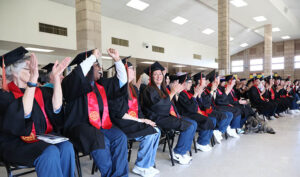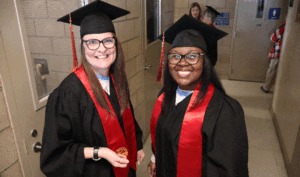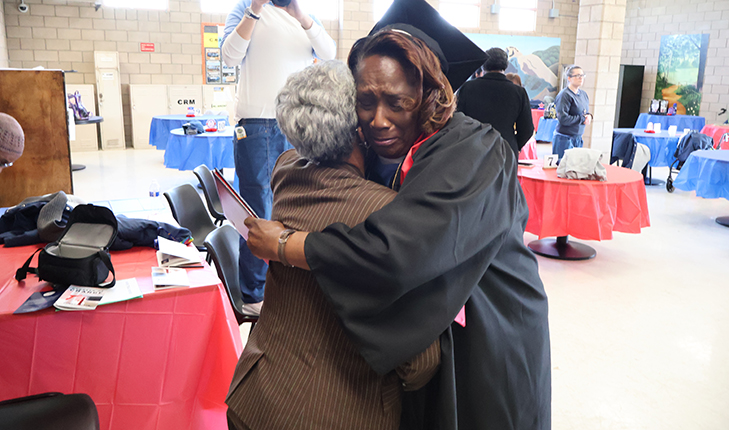 When Renecha Gulley walked to the podium to give her commencement speech, it marked a special moment for the Degrees of Change program.
When Renecha Gulley walked to the podium to give her commencement speech, it marked a special moment for the Degrees of Change program.
In a crowded gathering area at the Central California Women’s Facility near Chowchilla, family members, friends and supporters came together on March 11 to celebrate the first class to receive undergraduate college degrees from a women’s correctional facility in California.
They were joined by Fresno State faculty and administrators dressed in full regalia, and excited to honor 20 new Fresno State alumni.
“Being a part of Fresno State has not only been a great experience, but it has allowed us an opportunity to achieve an amazing accomplishment,” Gulley said. “It was not an easy journey. Prison is not an ideal place to be, nor is it full of opportunities. Therefore when they do arise, we have to seize those moments. Today we became Fresno State alumni. It has also allowed us to become a part of something outside of the prison community, something connected to society.”
Beginning in the spring 2021, the students took on-site classes from a broad mix of fields; including anthropology; criminology; sociology; and women’s, gender and sexuality studies.
Students also took classes from faculty who traveled to the facility from the Africana studies; Chicano and Latin American studies; earth and environmental sciences; English; geography; media, communications and journalism; and political science departments.
The bachelor’s of social sciences program is a degree completion program that allows students with an associate’s degree to take 60 upper division units focused on how social environment, culture, inequalities and policies shape society.
When the program started, assignments pushed students to develop critical thinking, communication and research skills, while managing other unexpected adjustments. Many had to adapt to laptops for the first time, and internet access was often spotty at best, meaning they studied in non-traditional places.
Many days it also meant bundling up in extra layers or sitting on hot cement, dealing with biting ants and sunburn.
“I remember opening my laptop and many people stopped and stared at me,” Gulley said. “We would also have to walk around in different directions trying to find a signal, just like the cell phone commercials. Sometimes when we found a signal, it was in an out-of-bounds place, and we would have to wait until later when they gave us special access.”
The class commitments were in addition to a schedule in which students worked jobs at the facility, and had other responsibilities such as self-help groups and rehabilitative programs. Other students, some who had minimal or no familiarity even using a laptop, learned how to navigate unfamiliar software like Canvas.
Dr. Emma Hughes, a criminology professor at Fresno State, helped oversee the creation of the program that put a mix of her teaching, research and community outreach experience with corrections and rehabilitation programs into practice. The former chair of the Department of Criminology joined Fresno State in 2007. She authored the book, “Education in Prison: Studying through Distance Learning.”
Working with other faculty from the College of Social Sciences and staff from the Division of Continuing and Global Education, she also helped create the same program for men at the nearby Valley State Prison. After years of planning, that program started in the fall of 2020, and celebrated its first graduation class in fall 2024.
In the community, Hughes has worked as an adviser to the Fresno County Local Criminal Justice Coordinating Council and with various projects at Avenal State Prison. The latter connection led to an exhibit of artwork from residents at the Avenal facility that was hosted in 2018 by the Fresno State Department of Art and Design, Criminology Department and Center for Creativity and the Arts, and was displayed at the M Street art gallery in downtown Fresno.
These partnerships helped her to found Project Rebound at Fresno State, a California State University support program for formerly incarcerated students that helps them transition into the university setting in pursuit of college degrees.
At the graduation ceremony this spring, Hughes applauded the graduates’ determination to complete this stage of their educational journey.
“This first class has not given up when things got tough or personal doubts may have emerged,” Hughes said, “and the students have supported and encouraged each other. They are trailblazers who have shown what is possible to the community and their families. This experience will also help them continue to shape, influence and impact the culture around them, and serve as leaders to those who follow in their footsteps.”

Eileen Huber (left) and Renecha Gulley (right).
The other graduate who spoke at the Chowchilla event, Eileen Huber, said she is equally indebted to the program.
After earning an associate’s degree from Feather River College while incarcerated, she knew how to learn in a non-traditional setting. Yet having university faculty travel to the facility each week to work with her personally, to challenge and support her, gave her a well of new confidence, skills and self-worth.
“I am standing on the shoulders of the amazing people graduating with me who believed in me way more than I believed in myself,” Huber said. “Fresno State teachers went up and beyond for us. Even dealing with COVID-19 (during) the very first class. They approached it all with positivity and treated us like real college students and human beings. This was huge to some of us. They took all the changes that came their way in stride and steadily encouraged us. No one was ever left behind to fail.”
Huber, who was scared of public speaking before the program, shared an extra secret for her newfound comfort with public speaking.
“I was looking at Chloe (a service dog for a fellow graduate) in the front row today so I wouldn’t concentrate on too many faces and start to get nervous,” Huber said. “That also made having Victor E. [IV, Fresno State’s live mascot] walk by us so we could pet him at the end extra special. I used to be a mess when I had to do any speaking, and now look at me.”
That refined skill will help her help others in future classes at the facility.
“I cannot say enough about the sincere and genuine encouragement and support I received from Dr. Hughes and my Fresno State professors,” Huber said. “We felt seen and heard by the faculty. I walk away with more than a degree from this journey. I am taking away self-worth, confidence and a whole different type of freedom. I am forever grateful and humbled by all that were a part of making and allowing this to happen, and hope I can help the next class, too.”





